Suchergebnisse
Workshop: Technologies for solar cooling in tropical climates & guided tour of world´s largest solar cooling System
5. April 2013
Singapore, SG
Main topics of the Singapore workshop: Absorption chilling, Desiccant technologies, Heat rejection, Economics, financing
SHC 2012 - International Conference on Solar Heating and Cooling for Buildings and Industry
9th - 11th July 2012
InterContinental San Francisco Hotel
San Francisco, US
SHC 2012 is the first of this new series of scientific and policy conferences on solar heating and cooling. The conference offers a discussion platform for project results and progress of the IEA SHC Programme´s work, but also targets a much wider audience of the solar heating and cooling community.
IEA Bioenergy Task 45 Webinar: An introduction to quantifying the climate effects of bioenergy
31. March 2022
Online, AT
IEA Bioenergy invites you to participate to this free international webinar. The webinar will address selected aspects and discussions that can help stakeholders to deepen their general understanding for available tools and methods as well as crucial elements to be considered in the quantification of climate impacts of bioenergy supply chains. This webinar will be held in the frame of IEA Bioenergy Task 45.
IEA Bioenergy Webinar: Synergies of Renewable Hydrogen and Biobased Value Chains - Case Studies
26. September 2024, 15:00 - 16:30 CEST
Online, AT
IEA Bioenergy invites you to the Webinar "Synergies of Renewable Hydrogen and Biobased Value Chains - Case Studies"
Whitepaper "Smart Grids: Real Case Experiences and Regional Perspectives in Mannheim and Salzburg"
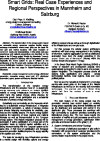
(2014)
A. Kießling, M. Strebl, A. Reuter
Herausgeber: nternational Smart Grid Action Network (ISGAN) Annex 4
Englisch, 6 Seiten
Downloads zur Publikation
ISGAN Annex 6 Workshop on Power Transmission and Distribution Interaction - a challenging MMORPG
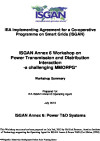
Workshop Summary (2013)
Herausgeber: International Smart Grid Action Network, Austrian Institute of Technology
Englisch, 6 Seiten
Downloads zur Publikation
IEA SHC - Collection of the Position Paper and all final deliverable papers of the joint task IEA SHC Task 42 and IEA ECES Annex 29 (2015)
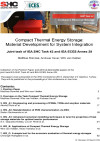
IEA SHC - Collection of the Position Paper and all final deliverable papers of the joint task IEA SHC Task 42 and IEA ECES Annex 29 (2015)
Matthias Rommel, Andreas Hauer, Wim van Helden
Herausgeber: IEA Solar Heating and Cooling Programme, Energy Conservation through Energy Storage, Task 42/Annex 29
Englisch, 71 Seiten
Downloads zur Publikation
Smart Grid Project Catalogue: Part 1, by Project Main Application. Smart Grid Project Catalogue: Part 2, by Contribution to Policy Goal. (2013)
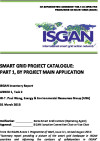
Herausgeber: International Smart Grid Action Network
Englisch, 563 Seiten
Downloads zur Publikation
Conference paper: Framework and Examples for the life cycle based assesment of biorefineries in IEA Bioenergy Task 42 - Biorefining

Herausgeber: 23 European Biomasse Conference and Exhibition (EUBCE), Proceedings, Vienna, Austria, June 1-6th, 2015, p. 1353-1358
Englisch, 6 Seiten
IEA User-Centred Energy Systems "TCP Day": Solutions for an inclusive energy transition
6. April 2022
FFG - Sensengasse 1, 1090 Wien (Building: "Haus der Forschung"; Room: "Franziska Seidl")
The Users Technology Collaboration Programme (TCP) day was dedicated to socio-technical topics of the energy transition, such as the involvement of users in innovation processes. Topics of the TCP day were current activities and highlights of the work within the Users TCP and input from other IEA TCPs with Austrian participation, addressing the topic of "inclusive energy transition".
IEA Bioenergy ExCo Workshop - Technology advances in liquid biofuels and renewable gas
17. October 2022
TUtheSky, Getreidemarkt 9, 1060 Vienna
In conjunction with the IEA Bioenergy ExCo 90 Meeting international and national experts gathered to explore the advances being made in biofuels technologies, as well as technologies to produce renewable gas (biomass based), and discussed what is needed to accelerate their roll out to the market.
Workshop: 48th International Energy Agency- Fluidised bed conversion (IEA-FBC) meeting
24. May 2004 -
25. May 2004
TU ViennaWien, AT
Workshop on "Future Challenges for Waste Combustion and Co-combustion in FBC"
IEA-4E: Achievements of appliance energy efficiency standards and labelling programs
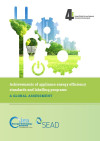
A global assessment (September 2015)
Herausgeber: IEA-4E
Englisch, 28 Seiten
Downloads zur Publikation
13th International Summer School on Advanced Studies of Polymer Electrolyte Fuel Cells
6. - 14. September 2021
TU Graz - Online-hybrid event – Graz & Yokohama, Graz, AT
The International Summer School is organized by the Fuel Cell and Hydrogen Group of Graz University of Technology (TU Graz), Austria in co-operation with Yokohama National University (YNU), Japan and with internationally recognised experts in the field of fuel cell research. The lectures include fundamental studies and advanced aspects of PEFCs.
International Symposium: Photovoltaic - Electricity from the Sun: Research - Marketing - Dissemination (Vienna, Austria)
2002-09-13 / 2002-09-14
Vienna, Chamber of Commerce Wiedner Hauptstrasse 63, A-1041 Vienna
Information about the activities in IEA-Photovoltaic Power Systems Program; experiences and status of PV in different countries, marketing, promotion incentives and dissemination strategies for photovoltaics, RTD and training.
IEA 4E PECTA Experts Workshop 2026
23. February 2026
Federal Ministry Innovation, Mobility and Infrastructure (BMIMI), Radetzkystraße 2, 1030 Vienna (Room RAD 6F13), Vienna, AT
This workshop brings together leading experts from research, industry, and policy to discuss the latest advances in power electronics. The program highlights progress in application readiness, reliability, and circular economy approaches, alongside key regulatory updates. It provides a platform to exchange knowledge, strengthen cooperation, and influences and shapes PECTA's future activities.
IEA EBC Annex 81: Data-Driven Smart Buildings
Digitalization has the potential to significantly reduce the costs of building operation. The Annex should improve access to low-cost, high-quality data from buildings and support the development of data-driven energy efficiency applications and analyses. This enables the optimization of building controls in real time and provides energy efficiency data and decision support for building managers.
IEA IETS Task 21: Decarbonizing industrial systems in a circular economy framework (working period 2022 - 2024)
Energy and CO2 savings through circular economy, especially directly through carbon circularity (CCU), and resource and energy efficiency through industrial symbiosis are two key approaches to decarbonizing industry.
IEA AFC: Technology Collaboration Programme on Advanced Fuel Cells
In the AFC TCP, both technology-oriented R&D activities (polymer electrolyte membrane fuel cells, solid oxide fuel cells, electrolysers) as well as analysis to implement fuel cells in commercial applications (stationary and mobile applications) are carried-out. System investigations and modelling complement the activities of this TCP.
IEA SHC Task 69: Solar Hot Water for 2030
Solar water heating will play a crucial role in the decarbonization of the energy system for 2030 and beyond. IEA SHC Task 69 focuses on two technologies which are likely to play the biggest role in the global solar hot water market: thermosyphon and photovoltaic (PV) hot water systems. For these technologies global market surveys, systems and component optimizations, cost reduction analyses and revision of standards are being conducted to accelerate growth in target markets.
